
Don’t stress about stress!
The app development project Adam was leading was getting intense. While the team was rapidly approaching beta, it was unclear if the app was performing well enough to release the beta version. The performance varied significantly from platform to platform, and phone to phone. The team was struggling to understand and fix the issues.
With each passing day, Adam noticed his stress level going up. He was worried about it. Adam told himself “Don’t stress!” He knew that stress can be very unhealthy and unhelpful.
Later, Chris sat down with Adam for their regular one-on-one meeting. “Adam, first, how are you? It seems like you’ve been quite stressed lately.”
“Sorry you’ve noticed Chris; I’ve been trying to keep it to myself. But you’re right, I have been feeling more and more stressed out. And I’m really worried about it. I heard that stress shortens our lives. I don’t want to be so stressed out!” Adam’s voice tightened as he talked; you could hear the stress in his voice.
Chris’ Advice

“Adam, please take a slow, deep breath. I understand what you’re going through. But do you know that stress can actually be helpful? In moderate doses, stress can be a great source of energy!”
Chris opened her browser and looked through her bookmarks. She said “I’ll send you a link to this video that I recently watched. It’s a TED talk by Kelly McGonigal about befriending stress.”
Chris continued: “In it she talks about a Harvard study that showed that people who view stress as helpful feel better and perform better. She even showed how this change in attitude results in physical changes in the body; we seem to handle stress in a healthier way when we view it as helpful.”
“Really?!?”, responded Adam, looking thoughtful. “I always try to avoid getting stressed out but I didn’t realize stress could actually be good.”
“That’s what the data shows. Look, it’s a stressful time in the project. That’s OK; it’s going to help all of us bring our best work as we move toward launch. There’s no need to stress about the fact that it’s stressful. That might move you from helpful, moderate stress to unhealthy and unhelpful severe stress.”
“Thanks Chris. I feel better already.”
The Science
Excess stress triggers the fight, flight, or freeze response, which can limit your brain’s ability to find solutions. The more stressed we are, the more likely we are to choose fight, flight, or freeze as a response. While those responses are great for keeping you alive when you see a mountain lion on a hike, they are typically not as helpful for doing your best work to complete a project.
The Yerkes Dodson law, originally published in 1908, shows that performance increases with physiological or mental arousal (AKA stress), but only up to a point. So moderate stress is helpful to our performance; extreme stress harmful. See “learn more” below for more detail.
So, viewing stress as helpful helps us feel better both psychologically and physically. This attitude can help ensure we aren’t adding more stress by stressing about our stress! Don’t stress about stress! If you have excess stress, coping effectively is critical. But stressing about the stress doesn’t help.
Apply It
The next time you feel stressed, take a positive attitude toward it. Remember that according to science, our performance, health, and happiness are maximized at a moderate amount of stress. Don’t add to your stress so it becomes excess, unhealthy, and unhelpful. Befriend your stress! It is helping you do your best work.
Learn More
This Harvard Business Review article does a good job of explaining the Yerkes Dodson curve, how moderate stress is ideal for us, and effective coping strategies:
- Are You Too Stressed to Be Productive? Or Not Stressed Enough? https://hbr.org/2016/04/are-you-too-stressed-to-be-productive-or-not-stressed-enough
To go straight to scientific journals, I recommend these articles:
- The Emotional Profiles Triangle: Working with Leaders Under Pressure. Catherine Sandler, (2012). Strategic HR Review, Vol. 11 Iss: 2, pp.65 – 71. http://www.emeraldinsight.com/doi/abs/10.1108/14754391211202116
- Neural Substrates Underlying Fear-Evoked Freezing: The Periaqueductal Grey–Cerebellar Link. Stella Koutsikou, Jonathan J. Crook, Emma V. Earl, J. Lianne Leith, Thomas C. Watson, Bridget M. Lumb, Richard Apps. First published: 22 April. https://physoc.onlinelibrary.wiley.com/doi/full/10.1113/jphysiol.2013.268714
As always, at Happy Brain Science, we welcome your questions or feedback.
(Please note this post is one in a series of blog posts about solutions featured in our card game and facilitation tool, Choose Happiness @ Work.)